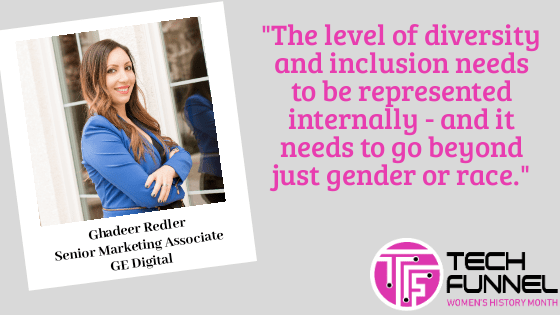Women’s History Month Interview Series 2019
Welcome to TechFunnel.com’s interview series for Women’s History Month where we are celebrating female executives, CEOs, business owners, and creators across various industries.
Joining us today is Ghadeer Redler.
Ghadeer Redler leads content development and storytelling at GE Digital. In her role, she focuses on developing content strategy and execution initiatives for web, demand generation, social media, videos, blog, and other digital collateral. Prior to joining GE Digital, Ghadeer supported content marketing and social media marketing efforts at a handful of other tech companies in Silicon Valley, including LinkedIn.
Ghadeer graduated from San Jose State University with a degree in Communications and Public Relations.
In this interview, Ghadeer talks about her journey to becoming a storyteller and content strategist and how content development has evolved over the years.
Take it away, Ghadeer!
Danni White: Tell us a little bit about yourself, your background, and how you navigate life as a successful woman in marketing and content development.
Ghadeer Redler: I have been a professional marketer for 8 years, and have spent the last 6 years working in tech marketing. When I graduated college, it was on the heels of the financial crisis so full-time marketing jobs were few and far between. Instead of getting discouraged, I kept my head down and focused on growing my network and gaining as much exposure as possible.
I worked in contract roles, freelance positions, and volunteered in order to get marketing experience under my belt while I continued my search for a full-time position. After two years of working at a variety of temporary marketing gigs and growing my contact base, it finally paid off. A connection that I had made thought of me when his company was looking to expand its marketing team, and I was hired on the spot. Looking back, those two years were not only the building blocks of my career, but also shaped a lot of my professional strengths that I have today.
DW: What made you want to become a storyteller and content strategist?
GR: I’ve been lucky enough to have worked in a lot of different marketing roles early on in my career, so having that level of exposure to so many different functions really helped me figure out what I liked and didn’t like. I’ve always loved writing and have been a writer for as long as I can remember. I knew that whatever I wanted to do, it had to be tied back to writing and storytelling since it’s what I’m most passionate about. When I started to work in content marketing, it seemed like a perfect fit because it was the best of both worlds—storytelling and strategic marketing.
DW: How has content development evolved over the past few years?
GR: Content development, much like the rest of marketing, is constantly evolving. As visual social media platforms and mobile continue to grow as channels for information consumption, it’s important that content development keeps up. Over the past few years, I’ve seen an increased demand for more bite-sized and media-rich content. That means developing content for newer formats like videos, gifs, podcasts, interactive graphics, and social media “stories.” While long-form content is still very important for things like traffic, search, and SEO, it’s good to find and test new ways to connect with your audience and deliver them valuable information, such as with micro-content.
DW: Over the last few years, workplace diversity and inclusion have been discussed at great lengths. What are your views on the subject?
GR: Workplace diversity and inclusion are absolutely necessary not only for a successful company culture but also for its brand. From a marketing perspective, I’ve seen a lot of companies receive backlash due to stereotypical missteps in their advertising.
When building a marketing campaign, it’s important to consider how it will be interpreted across diverse populations. And in order to do that successfully, that level of diversity and inclusion needs to be represented internally—and it needs to go beyond just gender or race. It’s crucial that a marketing team (like all other teams within an organization) is composed of a diverse range of people from many different backgrounds in order to deliver valuable and relevant marketing content.






